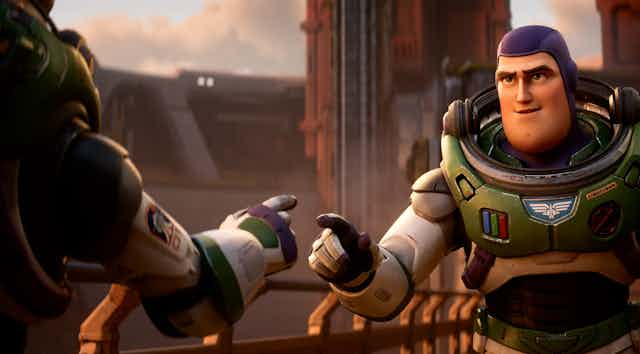Disney-Pixar’s latest animated escapade is about to hit our cinema screens. It’s the origin story of one of their most beloved characters – Toy Story’s Buzz Lightyear. In the lead-up to its release, online speculation soared after it was confirmed that Lightyear would include the company’s first same-sex kiss. The film’s producer, Galyn Susman, stated that the female character Hawthorne, voiced by Uzo Aduba, is in a “meaningful” relationship with another woman and a kiss occurs between them.
In response, several countries – including the United Arab Emirates, Malaysia, Egypt and Indonesia – recently announced they would be banning Lightyear from cinemas due to its “violation of their country’s media content standard” (in short, the inclusion of LGBTQ+ themes).
Susman responded by saying that no scenes would be cut, adding: “It’s great we are a part of something that’s making steps forward in the social inclusion capacity, but it’s frustrating there are still places that aren’t where they should be.”
Disney’s complicated LGBTQ+ history
While this may seem particularly progressive in a Disney-Pixar animation, it isn’t the first time online speculation has created a sense of “queer hype” around a new Pixar film. In 2016, Disney released the trailer for Finding Dory and fans spotted a supposedly lesbian couple in one of the scenes. And after the highly anticipated Toy Story 4 was released, online communities highlighted a small glimpse of a lesbian couple dropping off their child at daycare.
Yet despite small inclusive moments such as these, LGBTQ+ communities and fans have often been left disappointed with the final product. So while the Lightyear kiss marks a huge step forward for Disney, which has shied away from any overt LGBTQ+ representation in the past, it’s not surprising that many viewers remain sceptical. Will this be another minuscule attempt to please the LGBTQ+ audience, or is it really a groundbreaking moment for Disney and Pixar?
Susman’s insistence that Hawthorne’s kiss will be retained in all versions could be seen as a little ironic when considering Disney’s representational past. According to some reports, the same-sex kiss in Lightyear had originally been cut. However, it was later restored following the recent “Don’t Say Gay” ordeal that brought the company into the headlines.
Disney and ‘Don’t Say Gay’
In March 2022, the Florida Senate passed the Don’t Say Gay bill, which forbids schools from discussing and promoting topics surrounding sexual orientation and gender identity. Given its huge cultural reputation in the state, fans and employees were left frustrated by Disney’s lack of response to, or condemnation of, the bill.
Following a staff walk-out and major social media reaction, Disney changed its tune, halting all political donations to Republican and Democratic parties and giving a pledge to donate $5 million (£4.1 million) to LGBTQ+ charities and organisations. The company’s CEO, Bob Chapek, also stated in an internal memo that the “biggest impact” the company could make “in creating a more inclusive world is through the inspiring content we produce”.
Responding to this, a letter attributed to “the LGBTQIA+ employees of Pixar and their allies”, published by Variety, suggested that “nearly every moment of overtly gay affection is cut at Disney’s behest, regardless of when there is protest from both the creative teams and executive leadership”.

Disney did not comment directly on the letter but in another internal memo, Chapek responded by saying: “You needed me to be a stronger ally in the fight for equal rights and I let you down. I am sorry.”
Keeping the kiss
Now, in a dramatic shift, it appears Disney is refusing to budge over Lightyear – opting to take the inevitable financial loss of not playing in those banned markets for the sake of wider LGBTQ+ awareness and values.
In hindsight, the backlash from Disney’s slow reaction to the Don’t Say Gay bill may have elevated this need for change, and for an improved and contemporary public image. But it’s still important to acknowledge that this change is happening.
A vastly wider landscape of queer media is forming amid popular streaming shows such as Sex Education, Heartstopper and Euphoria – and Lightyear might signal that Disney is (slowly) joining in. Disney’s major reputation and cultural impact have the power to shape viewers’ perceptions and awareness. With an audience primarily consisting of children and families, seeing a same-sex kiss between two characters could be very important for self-identification, and could contribute towards wider LGBTQ+ acceptance.
Criticism of Lightyear and its same-sex kiss will inevitably ensue, so it is important that Disney stands its ground by staying true to LGBTQ+ values. I and other Disney-Pixar LGBTQ+ fans and allies, frustrated at its previous lack of representation, will be watching Lightyear with eagle eyes, waiting for the glorious moment we’ve been anticipating – some true representation for the first time.


